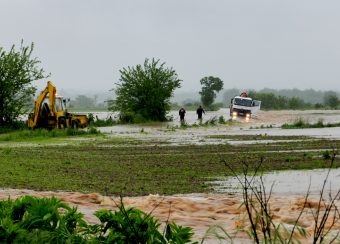
People in Serbia know little about climate change and its consequences, much less about possible solutions. Most people think that it is a problem someone else should be dealing with and not ourselves. However, in 2012, Serbia was hit by an unprecedented drought which caused damage to agriculture measured in billions. The following year, Serbia had the highest number of cases of West Nile virus. Both of these phenomena can be linked to climate change. The logical step was establishing the association that will invite citizens to climate action, and so in 2013, the non-profit, non-governmental organization One Degree Serbia was created.
“For the organization’s name, we have used the goal that prominent scientists, such as climatologist James Hansen and activists collaborating at the 350.org website believe we must set if we want to preserve biodiversity on the planet and the lifestyle we have now. Global warming must stop at +1 ° C in regard to the temperature before the Industrial Revolution. Unfortunately, the world is already very close to that limit. The limit promoted by politicians (+ 2°C) means that we, as humanity, consciously accept the significant loss of biodiversity and the negative impact on civilization and recognize that we cannot limit greenhouse gas (GHG) emissions and curb the fossil fuel sector. Keeping at one degree is safe, at two is not,” founder of the association Djordje Samardzija says. He also adds that the organization’s main idea is to get citizens, as well as all sectors of society, join the global climate action, above else for the sake of our children’s future on whose quality of life climate change will have a great impact.
In focus:
Immediately after its founding, the organization embarked on a vigorous public awareness campaign which was crowned with the most significant climate event in Serbia until then. In December 2014, in cooperation with the Intergovernmental Panel on Climate Change (IPCC), the Center for the Promotion of Science (CPN) and the Center for Sustainable Development, One Degree Serbia organised the presentation of the IPCC’s Fifth Report. And in cooperation with the CPN and the SANU in the winter of 2014/2015, they organized the Fifth Report on Climate Change exhibition.
“The year 2015 was named one of the most important ones when it comes to climate change. The whole world was preparing for the historic Climate Summit in Paris – COP21. The events we organized, their quality, attendance and media coverage gave us reasons to hope that we were on the right track and that we would be able to contribute to the national dialogue on climate change. This dialogue was to be held as part of the preparations for defining the Intended Nationally Determined Contribution to fight the climate change (INDC), which was the crucial national document for Paris. However, this dialogue never took place, and the Government of the Republic of Serbia in June 2015 submitted its INDC to the Secretariat of the United Nations Framework Convention on Climate Change (UNFCCC) without any public debate. The proposal, at first praised by the highest European officials, was very quickly declared inadequate by civil society organizations and media. The project practically did not envisage any reduction in emissions but rather an increase,” Samardzija points out.
As the association One Degree Serbia assumed that this would be the case, they started their most important project to date – Alternative INDC in February 2015. The goal of the project was to explore the potential for reducing CO2 emissions and complete the transition to renewable energy. The main results of the research were that Serbia could obtain all the energy it needs from renewable energy sources, and substantially more than the current consumption. The investment for the transition would cost between $ 3.1 and 6.9 billion dollars, which would annually amount to $ 1.1-2.5 per capita per day by 2050.

The Balkans and the Mediterranean are the regions that will be most affected by climate change, Samardzija said. We are the witnesses of this every year. The floods, heatwaves, droughts, forest fires, the spread of infectious diseases … People in Serbia are only aware of these impacts when they are personally affected. The climate change takes away several hundred million euros each year, with extremes in 2012 and 2014 when it reached billions, Samardzija says. That’s a lot for an economy like ours. According to data from the European organization HEAL, the additional health costs resulting from the production of electricity from coal amount to about 4 billion euros a year. The World Health Organization claims that Serbia loses about 33 per cent of its GDP every year due to air pollution. Such costs could not be compensated by the offset of a much stronger economic growth than we currently have, “Samardzija says. He adds that citizens are the key because they have to vote for politicians who can propose and implement the necessary solutions and support the companies that care about the environment through their everyday decisions about what to purchase.

